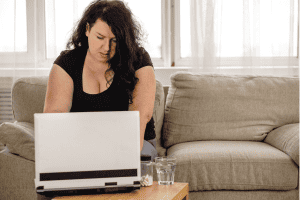Intrusive thoughts in motherhood – what they really mean and how to find support
Intrusive thoughts in motherhood are incredibly common, yet they’re rarely talked about, leaving so many new mothers feeling alone and afraid. I remember the first time I was hit with one – out of nowhere, a sudden image of dropping my baby flashed in my mind. It shook me. I didn’t understand why I was having such terrifying thoughts, and I wondered if it made me a bad mother. The truth is, these thoughts are not a reflection of who we are as parents. They are often a sign of our brain’s heightened state of alertness, trying to protect us. And although they can feel overwhelming, they can be supported, managed, and reduced.
What are intrusive thoughts in motherhood?
Intrusive thoughts are unwanted, distressing thoughts or mental images that seem to come out of nowhere. For new mothers, they can be particularly alarming, often focused around fears of harm coming to their baby. These thoughts might be about dropping your baby, suffocating them, or even seeing them harmed by someone else. It’s important to understand that having these thoughts does not mean you want to act on them. In fact, the very fact that they disturb you is a clear sign that you don’t want to harm your baby.
Common types of intrusive thoughts in motherhood
Intrusive thoughts can take many forms, but some common examples include:
- Imagining accidents happening to your baby, such as falling from a height or being injured.
- Thoughts about harming your baby, even though you have no intention or desire to do so.
- Disturbing images that seem to pop into your mind against your will.
- Fears that something you do will unintentionally cause your baby harm (e.g., dropping them or feeding them something dangerous).
These thoughts can feel incredibly isolating, and many mothers suffer in silence, too ashamed or afraid to speak up.
However, it’s important to know that you are not alone in experiencing these thoughts.
Why do intrusive thoughts happen as a mum?
The causes of intrusive thoughts can vary, but they’re often linked to the extreme stress, trauma, and hormonal changes that come with the postpartum period.
In motherhood, your brain is on high alert, constantly scanning for threats to keep your baby safe. This heightened state of vigilance can sometimes misfire, creating intrusive thoughts as a way of processing your deepest fears. Essentially, these thoughts are your brain’s attempt to protect your baby by playing out worst-case scenarios, even though they feel terrifying and debilitating.
For some mothers, intrusive thoughts can also be linked to postpartum anxiety or postpartum obsessive-compulsive disorder (OCD). These conditions involve repetitive, unwanted thoughts and behaviours that can feel difficult to control.
If you’ve experienced these thoughts, know that you’re not alone. Studies show that 70-90% of mothers report having intrusive thoughts about infant harm, and up to 50% of mothers have thoughts related to intentionally harming their baby. These statistics are a reminder that these thoughts, while scary, are part of the normal spectrum of postpartum experiences.
They do not define you as a person or a parent.
So, what can you do if you’re a mum struggling with intrusive thoughts?
1. Recognise and label intrusive thoughts
The first step is recognising these thoughts for what they are: just thoughts. They do not dictate your actions, and they are not a reflection of your character. Label them as intrusive thoughts to help separate them from your reality and reduce the power they have over you.
2. Challenge intrusive thoughts
Next, challenge these thoughts. Ask yourself, is this thought realistic? Is there any evidence to support it? What evidence contradicts it? Often, you’ll find that there’s no basis in reality for the thought, which can help you regain perspective.
3. Reframe intrusive thoughts
Reframing an intrusive thought can be powerful. For example, if you have a thought about accidentally harming your baby, remind yourself that you have always been careful and protective. You could even repeat a calming affirmation to yourself, like “I am a thoughtful and caring mother, and I keep my baby safe.” “I have never acted on intrusive thoughts in the past and I know I don’t want to now.”.
4. Engage in grounding and mindfulness activities to create space from these thoughts
Engaging in mindfulness activities can help ground you in the present moment, rather than getting caught up in the spiral of anxiety that intrusive thoughts can create. By paying attention to the here and now without judgement, you can observe these thoughts without letting them control your emotions or behaviour. They are thoughts that come and go, and they aren’t the truth of who you are or how you behave as a parent.
5. Talk to a trusted perinatal professional
Therapy can provide a safe space to explore your thoughts and feelings without judgement. A perinatal and birth trauma therapist can help you identify the underlying causes of your anxiety and provide tools to manage intrusive thoughts more effectively.
6. Lean on your support network
Remember, you don’t have to go through this alone. Whether it’s your partner, a close friend, or a support group for new mothers, reaching out to others can help you feel less isolated and more understood. Sharing your experience with someone you trust can lift some of the weight off your shoulders and provide invaluable perspective that these thoughts are more common than we know!
Why seeking support is so important
It’s crucial to seek help if these thoughts become overwhelming, frequent, or begin to affect your daily functioning. If you find yourself unable to escape these thoughts, or if they start to shift from sudden intrusions to more constant, persistent worries, it’s time to reach out. Connecting with a trauma-informed perinatal counsellor can help you process your thoughts and give you the tools to manage them more effectively.
Intrusive thoughts do not make you a bad mother. They are a common experience, and with support, they can become less intense and less frequent over time.
You don’t have to suffer in silence or carry the burden alone. With the right support, you can move past these thoughts and step into motherhood with confidence and compassion—for yourself and your baby.
If you’re ready to talk, or want to learn more about how perinatal counselling can support you to regain your sense of calm and confidence as a parent, I’m here for you.
You can learn more about individual perinatal and trauma counselling here, couples counselling here, or get in touch here.
I would love to support you to process your experience of intrusive thoughts.
Fiona
Additional support pathways
If you are concerned about your intrusive thoughts, you can seek support from your doctor, 000 in an emergency, as well as other services, including:
Beyond Blue, 24/7: (1300 224 636)
Lifeline, 24/7 (131 114)
Perinatal Anxiety and Depression Australia (PANDA) Helpline, Monday to Friday (9am-7.30pm) (1300 726 306)
Additional reading
Fiona Rogerson: Birth Trauma Counselling – 6 Ways It Can Help
Fiona Rogerson: An Easy Mindfulness Technique for Healthier Thought Patterns















